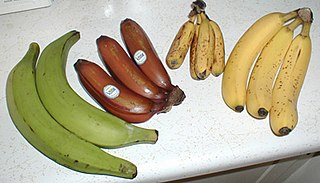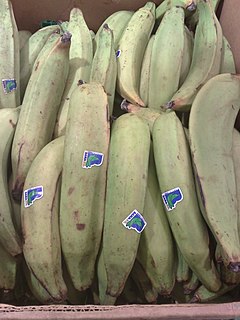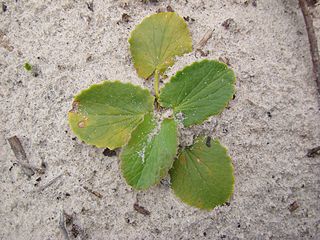
A banana is an edible fruit – botanically a berry – produced by several kinds of large herbaceous flowering plants in the genus Musa. In some countries, bananas used for cooking may be called "plantains", distinguishing them from dessert bananas. The fruit is variable in size, color, and firmness, but is usually elongated and curved, with soft flesh rich in starch covered with a rind, which may be green, yellow, red, purple, or brown when ripe. The fruits grow in clusters hanging from the top of the plant. Almost all modern edible seedless (parthenocarp) bananas come from two wild species – Musa acuminata and Musa balbisiana. The scientific names of most cultivated bananas are Musa acuminata, Musa balbisiana, and Musa × paradisiaca for the hybrid Musa acuminata × M. balbisiana, depending on their genomic constitution. The old scientific name for this hybrid, Musa sapientum, is no longer used.

Cooking bananas are banana cultivars in the genus Musa whose fruits are generally used in cooking. They may be eaten ripe or unripe and are generally starchy. Many cooking bananas are referred to as plantains or green bananas, although not all of them are true plantains. Bananas are treated as a starchy fruit with a relatively neutral flavour and soft texture when cooked. Bananas fruit all year round, making them a reliable all-season staple food.

Mount Sinai, also known as Mount Horeb or Gabal Musa, is a mountain in the Sinai Peninsula of Egypt that is a possible location of the biblical Mount Sinai, which is considered a holy site by the Abrahamic religions. Mount Sinai is mentioned many times in the Book of Exodus and other books of the Bible, and the Quran. According to Jewish, Christian, and Islamic tradition, the biblical Mount Sinai was the place where Moses received the Ten Commandments.

Musa I or Mansa Musa was the tenth Mansa, which translates to "sultan", "conqueror", or "emperor", of the wealthy West African Islamic Mali Empire. At the time of Musa's rise to the throne, the Malian Empire consisted of territory formerly belonging to the Ghana Empire in present-day southern Mauritania and in Melle (Mali) and the immediate surrounding areas. Musa held many titles, including "Emir of Melle", "Lord of the Mines of Wangara", "Conqueror of Ghanata", and at least a dozen others. Mansa Musa conquered 24 cities, each with surrounding districts containing villages and estates. During his reign, Mali may have been the largest producer of gold in the world; it was at a point of exceptional demand for the commodity. One of the richest people in history, he is known to have been enormously wealthy; reported as being inconceivably rich by contemporaries, Time magazine reported: "There's really no way to put an accurate number on his wealth."

The Ottoman Interregnum, or the Ottoman Civil War, was a civil war in the Ottoman Empire between the sons of Sultan Bayezid I following the defeat of their father at the Battle of Ankara on 20 July 1402. Although Mehmed Çelebi was confirmed as sultan by Timur, his brothers İsa Çelebi, Musa Çelebi, Süleyman Çelebi, and later, Mustafa Çelebi, refused to recognize his authority, each claiming the throne for himself. Civil war was the result. The Interregnum lasted a little under 11 years until the Battle of Çamurlu on 5 July 1413, when Mehmed Çelebi emerged as victor, crowned himself Sultan Mehmed I, and restored the empire.

Musa is one of two or three genera in the family Musaceae; it includes bananas and plantains. Around 70 species of Musa are known, with a broad variety of uses.
The Uganda Under-19 cricket team represents the nation of Uganda in under-19 cricket at international level. Their most recent match was against Ireland at Nondescripts Cricket Club Ground, Colombo, 18 February 2006.

Musalı is a village and municipality in the Jalilabad Rayon of Azerbaijan. It has a population of 1,725.

Musaly is a village in the Salyan Rayon of Azerbaijan.
Musalı or Musaly may refer to:

Ahmed Musa is a Nigerian professional footballer who plays as a forward and left winger for Saudi Arabian team Al-Nassr and the Nigeria national team.

Musa Çelebi was an Ottoman prince and a co-ruler of the empire for three years during the Ottoman Interregnum. The name Çelebi is an honorific title meaning gentleman.

James Mzamo Musa is a New Zealand footballer who currently plays for Phoenix Rising FC in United Soccer League.

Musa Vand is a village in Beyranvand-e Jonubi Rural District, Bayravand District, Khorramabad County, Lorestan Province, Iran. At the 2006 census, its population was 16, in 5 families.

Sarab-e Sheykh Musa is a village in Beyranvand-e Jonubi Rural District, Bayravand District, Khorramabad County, Lorestan Province, Iran. At the 2006 census, its population was 21, in 5 families.

Chah-e Musa Bumadi is a village in Bandan Rural District, in the Central District of Nehbandan County, South Khorasan Province, Iran. At the 2006 census, its population was 46, in 11 families.

Qeshlaq-e Musa Beyg is a village in Tirchai Rural District, Kandovan District, Meyaneh County, East Azerbaijan Province, Iran. At the 2006 census, its population was 288, in 63 families.

Ch. Surender Singh Memorial Herbal Park, Tosham is a herbal and medicinal plants park in Tosham town of Bhiwani district in the Indian state of Haryana.

Džanan Musa is a Bosnian professional basketball player for the Brooklyn Nets of the National Basketball Association (NBA). Standing at 6 ft 9 in (2.06 m) and weighing 215 pounds (98 kg), Musa plays the small forward position. He was selected by the Nets with the 29th pick in the 2018 NBA draft.
Methylopila musalis is a Gram-negative, aerobic, facultatively methanotrophic, rod-shaped non-spore-forming and motile bacterium species from the genus of Methylopila which has been isolated from the banana from the tree Musa paradisiaca var. sapientum in Ecuador.















